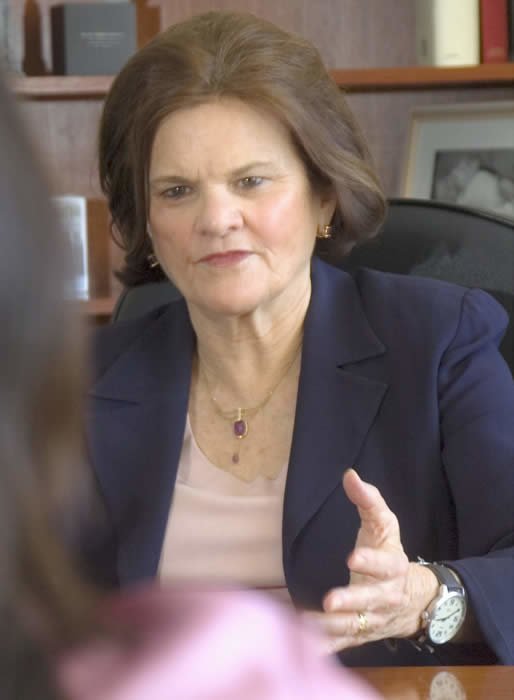|
About Betsy Gotbaum

Over the past decades, Public Advocate Betsy Gotbaum has led a distinguished career in the public and private sectors.
Betsy Gotbaum worked as advisor to three mayors; financial executive developing capital for start-up entrepreneurial firms; commissioner of the Department of Parks & Recreation; and President of the prestigious New-York Historical Society.
In all her various occupations, Gotbaum has been known for using nontraditional methods to turn troubled situations and institutions into success stories.
Since Betsy Gotbaum was inaugurated as Public Advocate in January 2002, her leadership paved the way for municipal reforms in education, school construction, prevention of crime against women, and the fight against hunger. Through her extensive experience in management and through collaboration with non-profits, businesses, and government agencies, Public Advocate Gotbaum reshaped the image of the Office into the primary place New Yorkers can turn with problems related to city government. Each week she helped solve hundreds of city service complaints made by New Yorkers who could not get help other places.
A native New Yorker, Betsy Gotbaum attended Barnard College and received her B.A. from George Washington University in 1961. After graduation, she moved to Recife, Brazil, where she taught high school English and mastered Spanish and Portuguese. She returned to New York several years later and earned a Masters Degree in Education from Teachers College, Columbia University.
Gotbaum began her career in government serving Mayor John Lindsay as District Manager for the Chelsea Clinton Neighborhood, Assistant for Women's Issues, and Assistant for Education. Gotbaum continued her work in education with Mayor Abraham Beame, managing a training program for school security officers.
In the late 1970s, she was recruited to run the New York City Police Foundation. At the Police Foundation, she developed an innovative citywide health screening and work-site hypertension program with the NYPD and facilitated an intensive training program for 911 operators. She also created a program engaging New York City in a campaign to purchase bullet proof vests for every police officer.
Gotbaum went on to run the National Alliance against Violence, where she created a program with the NYPD and other police departments across the country to protect neighborhoods and schools from handgun violence. For four years following this nationwide effort, Betsy Gotbaum worked for a venture capital firm, raising capital for start-up companies.
In 1990, newly-elected Mayor David Dinkins appointed Betsy Gotbaum the first female New York City Commissioner of Parks & Recreation. At the beginning of her tenure, her budget was cut radically. She responded by adopting business sector management techniques to improve efficiency and raise the morale of park workers. She expanded her workforce through an innovative welfare-to-work training program and established the City Parks Foundation, which brought in millions of dollars to pay for park restoration, maintenance, and recreation programs throughout the city. Betsy Gotbaum also created a toll-free Parks hotline and successfully argued for a change in city policy allowing the Gay Men's Health Crisis (GMHC) and other organizations to use Central Park for fundraising events. Her action allowed more people than ever before to participate in the GMHC's AIDS Walk, resulting in a significant increase in proceeds for people with HIV/AIDS.
In June 1994, Gotbaum became President of The New-York Historical Society, New York's oldest museum and one of the country's most extensive research libraries. When she took over, the Historical Society was closed to the public and on the verge of bankruptcy after years of mismanagement. Betsy Gotbaum rescued the institution from financial collapse, renovated its landmark building, and recalled its collections from various warehouses. In November 2000, she opened the innovative Henry Luce III Center for the Study of American Culture. She also instituted exhibitions, education and public programs for a diverse and ever-increasing audience, leaving the society with a $33 million endowment. She resigned from the Historical Society to run for Public Advocate.
Betsy Gotbaum was elected as Public Advocate in 2001, and reelected in 2005. In both elections, she received more votes than other candidates, including those for mayor or comptroller. She is only the third woman elected to a city-wide post in NYC history.
Throughout her two terms, she helped tens of thousands of families, seniors, and children solve their problems with city government. Upon taking office, she pledged to focus on five main policy areas—hunger, housing, child welfare, education, and women’s issues—and, over the course of her first four years in office, made important strides in each.
Public Advocate Gotbaum exposed major problems in the special education system, prompting the Department of Education to set aside more money for special needs students. She successfully lobbied to stop the administration from cutting preventive services that help families keep their children out of foster care. Her recommendations led to reforms in the food stamp application process that helped thousands of New York City families put food on their tables. She launched major studies that shed new light on the City’s affordable housing crisis and the provision of government services to survivors of domestic violence.
Throughout her career, Betsy Gotbaum has shown commitment to community service. She has served on the boards of innumerable not-for-profit organizations, including the Community Service Society; The Valley Recreation and Youth Development Program in Harlem; Goodwill Industries; and the Municipal Arts Society. Her best-known talent is her ability to raise funds to support the projects and organizations that are meaningful to her.
After September 11th, Betsy Gotbaum raised $1 million for volunteer ambulance companies whose equipment was destroyed when the World Trade Center collapsed. She also secured funding to purchase bullet-proof vests for Israeli EMT workers and raised $1 million for a corporation dedicated to increasing access to food stamps for all New Yorkers.
|